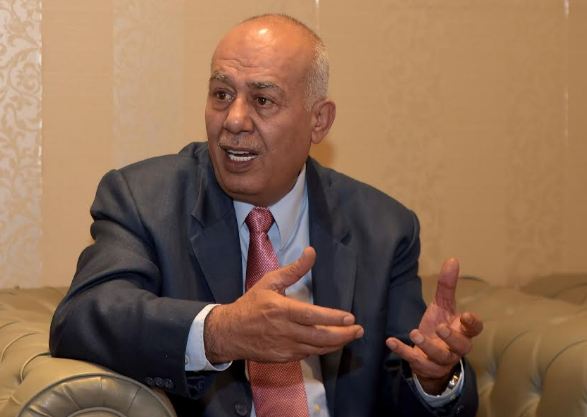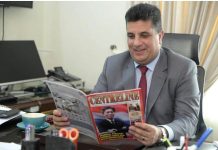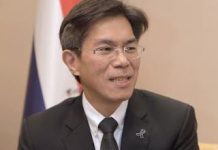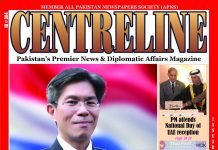The Ambassador of the State of Palestine, Dr. Zuhair Zaid, recently gave an exclusive interview to Daily Islamabad POST, Centreline journal and Diplomatic News Agency (DNA). Having recently assumed his duties in Pakistan, Ambassador Zaid spoke candidly about various dimensions of the ongoing Gaza crisis. He offered insightful commentary on the international community’s approach to the Palestinian issue and shared his perspective on the evolving situation. Below is the full text of his interview.
Exclusive
Ansar Mahmood Bhatti
Q: Your Excellency, how do you see Pakistan’s support for Palestine?
As a Palestinian, I want to express our deep and heartfelt gratitude for the unwavering support we have continuously received from Pakistan. This solidarity—both in word and deed—has been a source of strength and comfort for our people, especially in times of hardship and crisis.
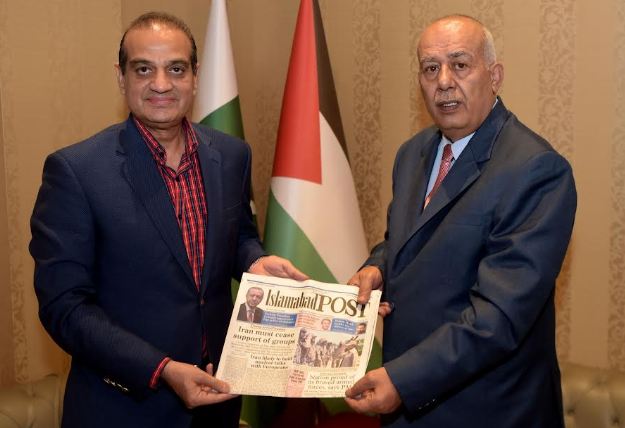
Pakistan’s position on the Palestinian cause has always been principled, clear, and steadfast. On the international stage, whether at the United Nations, the Organisation of Islamic Cooperation (OIC), or other global forums, Pakistan has consistently raised its voice in defense of Palestinian rights. It has never hesitated to condemn injustice, illegal occupation, and human rights violations committed against the Palestinian people. This diplomatic support reflects a deep-rooted commitment to justice, freedom, and the right of people to self-determination.
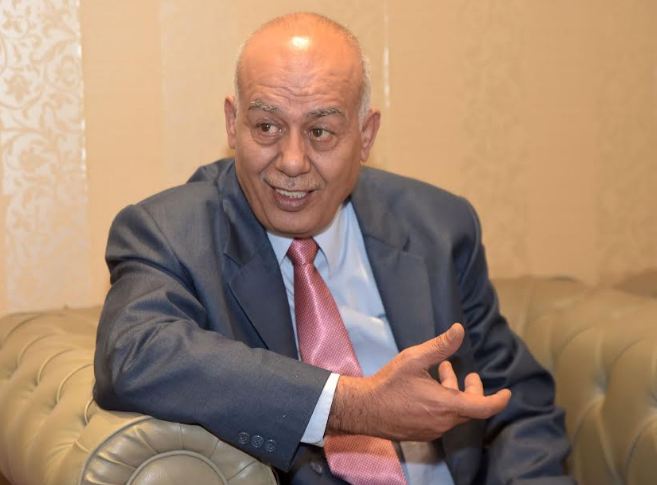
Importantly, this solidarity is not confined to the corridors of power. The people of Pakistan—across all walks of life—have shown immense empathy and unity with the Palestinian cause. From peaceful demonstrations and awareness campaigns to heartfelt messages on social media, the national consensus in support of Palestine is both overwhelming and deeply moving. It is rare to witness such a unified front across an entire nation, and it speaks volumes about the moral compass of the Pakistani people.
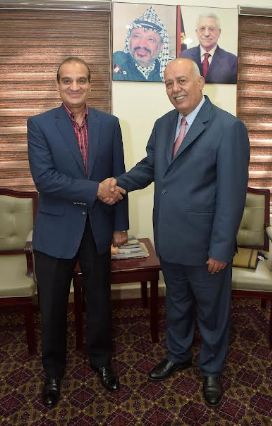
Beyond political support, Pakistan has also extended a generous hand on the humanitarian front. Numerous Pakistani relief organizations, often encouraged and facilitated by the government, have provided vital aid to Palestinians in times of dire need. From medical supplies and food packages to tents and emergency assistance, Pakistan’s humanitarian outreach has reached our people in refugee camps, conflict zones, and besieged areas. These acts of compassion and brotherhood are not forgotten—they are etched in our hearts as a reminder that we are not alone in our struggle. In every way, Pakistan has stood by us. This enduring friendship is a beacon of hope for our nation, and we are profoundly grateful for it.
Q: You have mentioned a desire for practical cooperation between Pakistan and Palestine. Could you elaborate?
Yes, we are keen to move beyond symbolic gestures and establish practical cooperation. We have already presented several agreements to the Government of Pakistan for consideration. With full cooperation from Pakistan, I am hopeful that we will soon sign these agreements, enabling us to enhance cooperation on economic, educational, and cultural levels. This is my vision—to see concrete progress during my tenure.
Q: Is there any parliamentary-level cooperation being considered?
Absolutely. I believe the Pakistani Parliament and Senate fully support the Palestinian cause. I see no obstacles—legal or otherwise—in enhancing our cooperation. In fact, there have been previous discussions about inviting Pakistani parliamentarians to visit Palestine.
Such visits, especially to meet Palestinian prisoners, can be a source of moral support. But the challenge is that Israel controls all borders, making such visits practically impossible unless Israeli authorities allow entry.
Q: You were once imprisoned in Israel. Would you share that experience?
Certainly. I am part of my people and their struggle. I spent 14 years in Israeli prisons. Over one million Palestinians have faced imprisonment. Many are detained under so-called “administrative detention”—without charges or trial—based on intelligence reports. The initial detention is for six months, often renewed repeatedly. Some remain imprisoned for years under this unjust system.
Q: How do you assess the humanitarian aid currently reaching Gaza?
The current situation in Gaza has surpassed the bounds of humanitarian crisis, embodying a systematic and calculated campaign of violence, displacement, and deprivation. The insufficient aid trickling into the region barely scratches the surface of the dire needs on the ground. Israel’s ongoing blockade and deliberate restriction of essential resources—food, water, medicine—constitute a form of collective punishment that violates international law and moral conscience alike.
The demolition of homes, arbitrary arrests, and settler violence operate in tandem with official state policy to dispossess Palestinians of their land and identity. What is unfolding is not just a military conflict—it is the systematic cleansing of a people from their homeland, pursued through both overt aggression and structural oppression.
Q: What does the Nakba mean to Palestinians?
Nakba, or “catastrophe,” refers to the events of 1948 when Palestinians were expelled from their homeland. It began much earlier, with the Balfour Declaration—supported by the British and Americans—granting Zionists the right to establish a state in Palestine.
This was an unjust and illogical decision. Palestinians are paying the price for crimes committed against Jews in Europe—crimes we had no part in. Historically, Muslims and Arabs welcomed Jews fleeing persecution, offering them shelter and respect.
Q: How do you view the roles of Muslim countries like Saudi Arabia, Turkey, and Iran?
We, as Palestinians, look to our brothers and sisters across the Muslim world with hope and expectation. Our cause is not just a national struggle—it is a humanitarian and moral issue that resonates deeply with the Islamic Ummah. We do not ask for war or conflict; rather, we appeal for meaningful and sustained diplomatic, political, and economic pressure on those who continue to deny our fundamental rights. In today’s interconnected world, political influence and international alliances can be powerful tools to advocate for justice and to hold aggressors accountable.
We particularly commend the principled position taken by the Kingdom of Saudi Arabia under the leadership of Crown Prince Mohammed bin Salman. The clear and unwavering stance—that normalization with Israel cannot proceed without a just and comprehensive resolution to the Palestinian issue—has been a significant and encouraging development. This policy not only affirms the importance of Palestinian rights but also sends a strong message to the international community that peace cannot be built upon injustice. We trust the leadership of Saudi Arabia, whose central role in the Muslim world and on the global stage gives weight to its positions. With their support, we feel stronger, more hopeful, and less alone in our struggle.
Likewise, the roles played by countries such as Egypt and Jordan have been vital. As neighbors with direct stakes in the region’s stability and with longstanding historical ties to the Palestinian people, their involvement has been instrumental in diplomatic efforts, humanitarian support, and mediation during moments of crisis.
We believe that the collective strength of the Muslim world—when guided by unity, justice, and compassion—can influence international dynamics in favor of a just and lasting solution.
Q: Some countries like UAE and Bahrain have normalized ties with Israel. Your thoughts?
We respect sovereign decisions, but we must question what has been gained. Unity within the Arab League and commitment to its initiatives are vital. Without collective Arab consensus, such moves weaken our position. The Zionist mindset still sees Arabs and Muslims as adversaries, regardless of peace deals.
As regards the role of the OIC and the Arab League, both work in harmony. Both institutions have always supported Palestine on political and humanitarian fronts.
Q: What role do Palestinian youth play in the resistance?
Our youth have always been at the forefront of the struggle. From student movements to social media activism, they are deeply engaged. Even in Pakistan, we have over 400 Palestinian students enrolled in various universities, with many having graduated already. They are our future and a crucial part of our resistance.
Q: Has social media impacted global opinion on Palestine?
“Yes, immensely. Social media has played a pivotal role in shaping global awareness and opinion regarding the ongoing atrocities committed by Israel against the Palestinian people. Through platforms like X (formerly Twitter), Instagram, TikTok, and Facebook, graphic evidence of the destruction in Gaza, the suffering of civilians, and violations of international law are being disseminated in real time. This direct flow of information has bypassed traditional media filters and given the global public, especially the youth, unfiltered access to the truth.”
“Across the United States, Canada, and Europe, we are now witnessing a historic shift. University students, young activists, and even schoolchildren are organizing protests, sit-ins, and public awareness campaigns demanding justice for Palestine.
These movements reflect a global awakening—a deep moral response from younger generations who have grown up with values rooted in human rights, equality, and social justice. They no longer rely solely on state narratives; instead, they seek the truth, and they stand firmly on the side of the oppressed.”
“The power of social media has allowed Palestinian voices—voices that were once marginalized or silenced on international platforms—to be heard loudly and clearly. It has also fostered solidarity movements, linking people from different cultures and backgrounds in a united front against oppression. The impact has been so significant that governments and institutions have begun to respond—sometimes with suppression, but increasingly with calls for inquiry and accountability.”
“This shift in global consciousness, driven largely by the youth and amplified through social media, gives us hope. It assures us that the Palestinian cause is not isolated. It is part of a broader global struggle for dignity, justice, and human rights. And as long as these voices continue to rise, the truth cannot be buried.”
Q: Finally, Your Excellency, a message for the people of Pakistan?
The people of Pakistan are our beloved brothers and sisters. The love and support we receive from every Pakistani—young, old, political, or civilian—is unparalleled. My message, especially to youth, is to keep Palestine in your hearts. We pray for peace, prosperity, and stability for Pakistan, and we are forever grateful for your solidarity.
Pakistan has always stood by the choices of the Palestinian people—firmly supporting our legitimate rights and legal institutions. This unwavering support is deeply valued.
To those political parties in Pakistan that may hold differing views, my humble message is this: unity is vital. Pakistan should continue to serve as a unifying force for the Palestinian cause, not one that contributes to division.
As for the various organizations involved—whether political or humanitarian—they are merely instruments. We, as freedom fighters, are also instruments. The ultimate goal for all of us is one and the same: Palestine. Allah SWT blessed us to be the guards of the first Qibla of Al-Masjid Al-Mubarak. We know that this holy land for all and also for Pakistan. Keep always Palestine above everything.
The liberation of the Palestinian people is our shared objective. This goal should be embraced as a guiding principle by our Pakistani brothers and sisters. Lastly, I want to express that just as the people of Pakistan love, respect, and support us—we, too, feel the same for you. We pray for Pakistan’s stability, for peace across your land, and for your continued development and prosperity.

